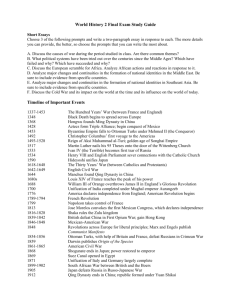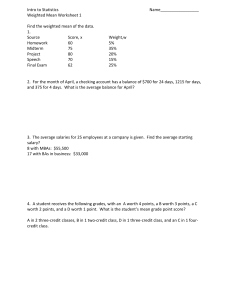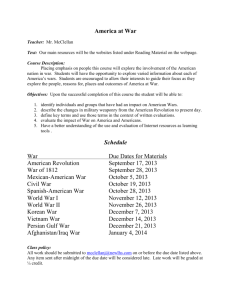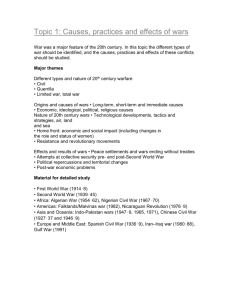HKCEE History Past papers ( Essay
advertisement
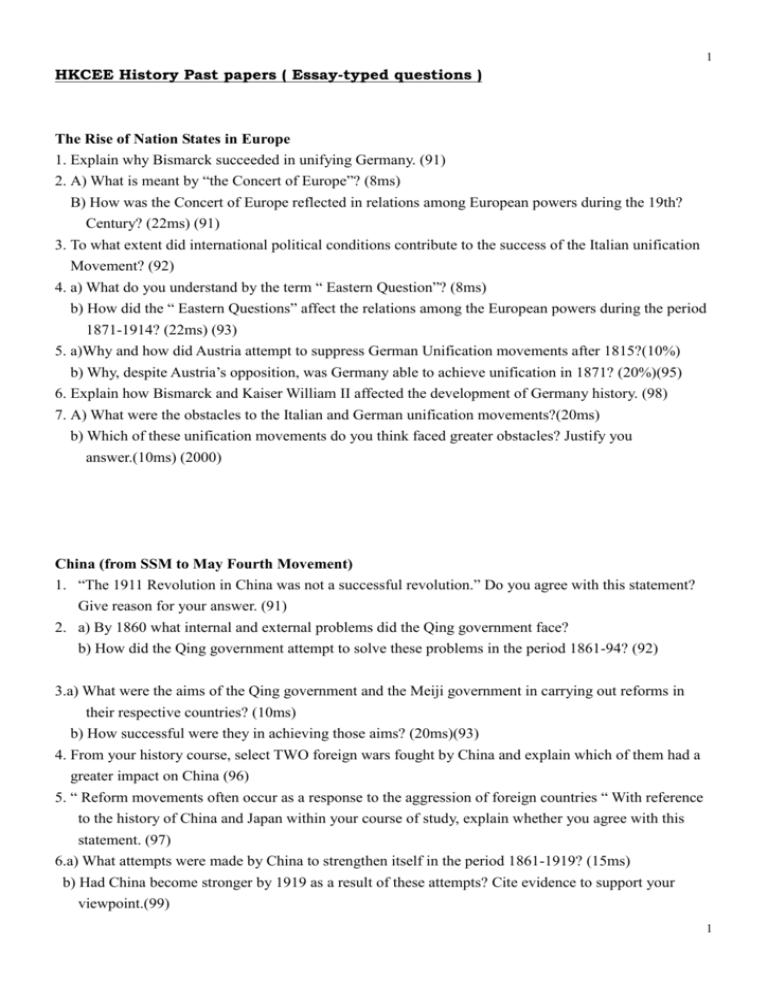
1 HKCEE History Past papers ( Essay-typed questions ) The Rise of Nation States in Europe 1. Explain why Bismarck succeeded in unifying Germany. (91) 2. A) What is meant by “the Concert of Europe”? (8ms) B) How was the Concert of Europe reflected in relations among European powers during the 19th? Century? (22ms) (91) 3. To what extent did international political conditions contribute to the success of the Italian unification Movement? (92) 4. a) What do you understand by the term “ Eastern Question”? (8ms) b) How did the “ Eastern Questions” affect the relations among the European powers during the period 1871-1914? (22ms) (93) 5. a)Why and how did Austria attempt to suppress German Unification movements after 1815?(10%) b) Why, despite Austria’s opposition, was Germany able to achieve unification in 1871? (20%)(95) 6. Explain how Bismarck and Kaiser William II affected the development of Germany history. (98) 7. A) What were the obstacles to the Italian and German unification movements?(20ms) b) Which of these unification movements do you think faced greater obstacles? Justify you answer.(10ms) (2000) China (from SSM to May Fourth Movement) 1. “The 1911 Revolution in China was not a successful revolution.” Do you agree with this statement? Give reason for your answer. (91) 2. a) By 1860 what internal and external problems did the Qing government face? b) How did the Qing government attempt to solve these problems in the period 1861-94? (92) 3.a) What were the aims of the Qing government and the Meiji government in carrying out reforms in their respective countries? (10ms) b) How successful were they in achieving those aims? (20ms)(93) 4. From your history course, select TWO foreign wars fought by China and explain which of them had a greater impact on China (96) 5. “ Reform movements often occur as a response to the aggression of foreign countries “ With reference to the history of China and Japan within your course of study, explain whether you agree with this statement. (97) 6.a) What attempts were made by China to strengthen itself in the period 1861-1919? (15ms) b) Had China become stronger by 1919 as a result of these attempts? Cite evidence to support your viewpoint.(99) 1 2 7a) What obstacles did China face it its efforts to strengthen itself in the period 1861-1912? (20ms) b) Despite the obstacles you have identified in (a), what achievements had China made it its efforts to strengthen itself by 1912?(10ms)(2001) 8. a) Under what circumstances did the Czarist government and the Qing government make reform efforts in the early 20th century? (20ms) b) How were the Czarist regime and the Qing regime affected by such reform efforts? (2002) 8. a) Why did wars occur between China and Japan in 1894-95 and in 1937-45? (20ms) b) Select the Sino-Japanese war of either 1894-95 or 1937-45 , and discuss its significance in Chinese history. (10ms) (2004) Japan 1. Trace the efforts made by Japan to achieve the status of a world power in the period 1868-1919. (92) 2. a) What were the aims of the Qing government and the Meiji government in carrying out reforms in their respective countries? (10ms) b) How successful were they in achieving those aims? (20ms)(93) 3. To what extent did Japan’s emergence as a world power by 1919 result form its victories in foreign wars? (94) 4. “ Reform movements often occur as a response to the aggression of foreign countries “ With reference to the history of China and Japan within your course of study, explain whether you agree with this statement.(97) 5. Select two foreign wars fought by Japan in the 20th century and explain their importance in Japanese history. (98) 6. a) What do you think are the necessary conditions for a country to become a “world power”? (10ms) b) Could Japan be regarded as a “world power” by the year 1922? Explain your answer with reference to the conditions you mentioned in (a) . (20ms) (2000) 9. a) Why did Russia and Japan come into conflict with each other in Asia in the period 1895-1905? (15 ms) b) How did the Russo-Japanese War affected the development in Meiji Japan and Czarist Russia? (15m) (2003) 2 3 Russia 1. In what ways was Russia around 1914 different from Russia around 1860? (91) 2.With reference to any TWO wars involving Russia within your history course, explain: a) why Russia entered the wars;(15ms) b) how Russia was affected by the wars(15ms) (99) 3. a) What attempts were made by the Czarist government in the period 1881-1917 to maintain its rule? (15ms) b) Explain why these attempts failed to save the Czarism. (15ms) (2001) 4. a) Under what circumstances did the Czarist government and the Qing government make reform efforts in the early 20th century? (20ms) b) How were the Czarist regime and the Qing regime affected by such reform efforts? (2002) The First World War 1. Describe and account for the ways that the victorious powers treated the defeated countries after the First and the Second World Wars. (91) 2. How and why did Russia, the Untied States and China enter the First World War? (92) 3. “Fundamentally , the First World War was caused by nationalism , colonial rivalry , the alliance system , and the armaments race.” With reference to this statement, select ONE country and explain why it entered the First World War.(95) 4. In what ways should Germany be held responsible for bringing about WWI and WWII? (97) 5. Select one victorious country and one defeated country in the First World War, and discuss how the War affected their historical developments up to the 1930s. (2001) 6. a) In what ways did nationalism pose a threat to peace in Europe during the period 1870-1914 ? (15ms) b) Do you think that nationalism still posed a threat to peace in Europe during the perod 1919-39? (15ms)(2002) 7. Select any one country within your history course: a) Describe the foreign relations of the country in the period 1870-1914. (15ms) b) Discuss how the First World War affected the foreign relations of the country in the perod 1919-1939. (15ms) 2003 8. a) Examine the foreign policies of Kaiser William II and those of Hitler. (20ms) b) Select the foreign policies of either Kaiser William II or Hitler, and discuss how such foreign policies affected relations among the European powers at the time. (10ms) (2004) Inter-war period 1. With reference to the internal and external policies of any ONE state within your history course, identify the main features of totalitarian rule. (91) 2. Why did democracy fail to take root in Germany and Japan between the two world wars? (92) 3. “The success of a person is due to favorable circumstance rather than his/ her abilities. “ Do you agree with this statement? Explain your answer with reference to the career of any one historical figure within your history course.(94) 3 4 4. a)What attempts were made by the powers in 1919-39 to promote world peace?(10ms) c) Why did these attempts fail to maintain world peace eventually? (20ms) (94) 5. Select one of the following persons and then answer questions (a) and (b) -Hitler -Mussolini -Stalin a) Why was he able to rise to power? (20ms) b) Why is he regarded as a dictator? (10ms) (95) 6. a) What, in your opinion, are the characteristics of a great leader? (8ms) c) Select one person from your history course and explain why you consider him/ her to be a great leader. (22ms) (96) 7. Explain the importance of the following as causes of the Second World War: (2000) a) the failure of collective security;(20ms) b) the Great Depression(10ms) 8. a) In what ways did nationalism pose a thret to peace in Europe during the period 1870-1914 ?(15 ms) b) Do you think that nationalism still posed a threat to peace in Europe during the period 1919-39? (15 ms) (2002) 8. a) Discuss the problems faced by the democratic governments of Italy and Germany after the First World War. (15ms0 b) How did the dictators in Italy and Germany attempt to solve such problems after they came to power? Explain your answer with reference to relevant examples. (15 ms) 2003 The Post Second World World period 1. Describe and account for the ways that the victorious powers treated the defeated countries after the First and the Second World Wars. (91) 2.Briefly describe the United States’ involvement in European and Asian affairs during the period 194670. (92) 3.a) In what ways were the years 1945-70 a period of international cooperation?(15ms) d) What factors led to the different forms of cooperation that occurred during those years? (15ms)(93) 4.With reference to one international crisis that occurred in the post-Second World War period , explain a) why and how the crisis occurred; and(22ms) b) how it affected the international relation of the time. (8ms)(96) 5.To what extent could the Cold War be regarded as an ideological conflict between the capitalist and communist blocs?(97) 6.Select one international conference from a) and one international organization from b) and illustrate how effective they were in maintaining peace: a) either the Congress of Berlin (1878) 0r the Washington Conference (1921-22) (10ms) b) either the League of Nations or the United Nations Organization (20ms) (99) 4 5 7. a) Account for the rising influence of the USA and the USSR in world politics in the 1940s (15ms) b) In what ways did these two powers influence internaitonal relations in the 1950s and the 1960s? (2002) 7.a) Identify the differences between capitalist and communist systems. (10ms) b) How did the co-existence of the two systems lead to international conflict and co-operation after the Second World War up to the 1960s? (20ms) (2004) General 1. To what extent was the downfall of a government caused by external factors? Discuss with reference to any One country within your history course. (93) 2. “The success of a person is due to favorable circumstance rather than his/ her abilities. “ Do you agree with this statement? Explain your answer with reference to the career of any one historical figure within your history course.(94) 3. a) What, in your opinion, are the characteristics of a great leader? (22%) b) Select one person from your history course and explain why you consider him/ her to be a great leader. (22%) (96) 4. Select tow of the following years and explain whether they could be regarded a turning points in history: a) 1848 b) 1870 c) 1919 d) 1945 5

